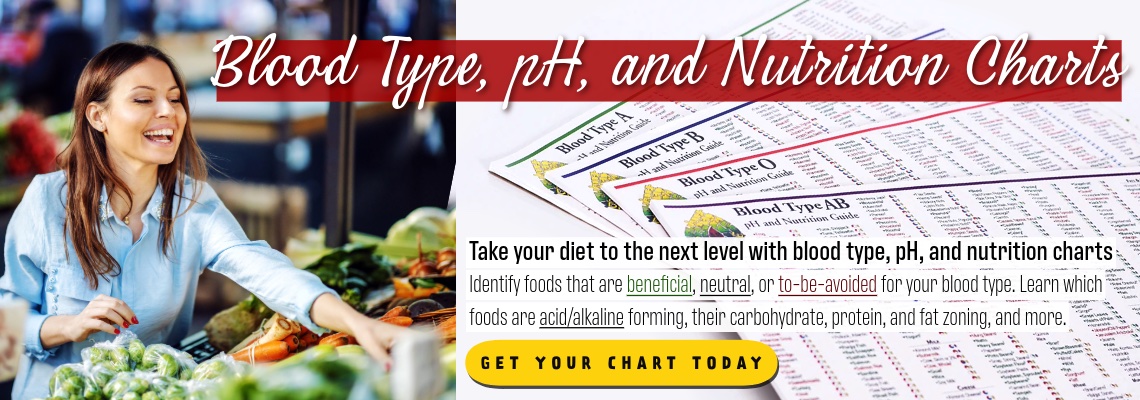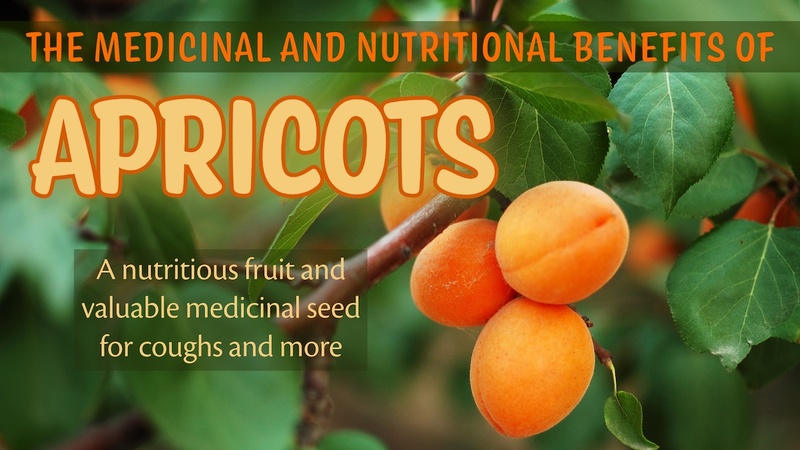
I don’t know about you, but I love tree-ripened apricots. Unfortunately, like many other fruits, apricots are often picked before they are fully ripe so they can be shipped to faraway grocery stores. This doesn’t allow their flavor to develop fully, so I prefer to get apricots locally, especially if I can pick them myself.
Besides being a nutritious fruit, apricots are also a source of medicine. Apricot seeds are used in Chinese herbalism for problems in the lung and large intestine meridians. In Western medicine, an extract from the kernels known as laetrile has been used as a controversial cancer treatment. In this article, we’ll explore the medicinal and nutritional benefits of the apricot.
Apricot Seeds as a Medicine
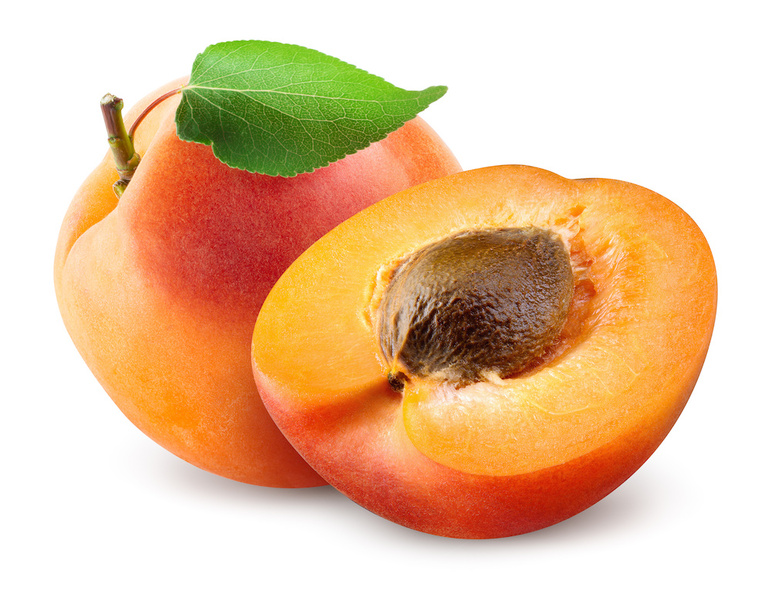 Apricots are drupes, fleshy fruits with a stony seed inside. The part used medicinally is the kernel, which is found inside the apricot pit. You crack the shell and, much like you would shell an almond, remove the pit or kernel inside. The Chinese medicine Xing Ren consists of the dried seeds from ripe apricots. It is considered warming, with a bitter-sweet taste, and is used to tonify the organs associated with the metal element, the large intestines and lungs.
Apricots are drupes, fleshy fruits with a stony seed inside. The part used medicinally is the kernel, which is found inside the apricot pit. You crack the shell and, much like you would shell an almond, remove the pit or kernel inside. The Chinese medicine Xing Ren consists of the dried seeds from ripe apricots. It is considered warming, with a bitter-sweet taste, and is used to tonify the organs associated with the metal element, the large intestines and lungs.
The primary use of Xing Ren is as an antitussive or cough suppressant. It is used to stop coughing and wheezing and can be used with either cold or hot conditions in the lungs. It’s used to treat dry cough, asthma, and bronchitis. It is also used to help lubricate the intestines and relieve constipation.
Like most herbs in TCM, it is usually used as part of a formula. It’s found in two TCM formulas that I use. One is a Metal-Decreasing Formula for easing acute respiratory congestion, and the other is an Earth-Decreasing Formula for digestive stagnation. It’s also used in a Wild Cherry Cough Syrup blend I sometimes buy from the health food store to ease coughs and respiratory congestion.
Apricot Seeds, Amygdalin, and Laetrile
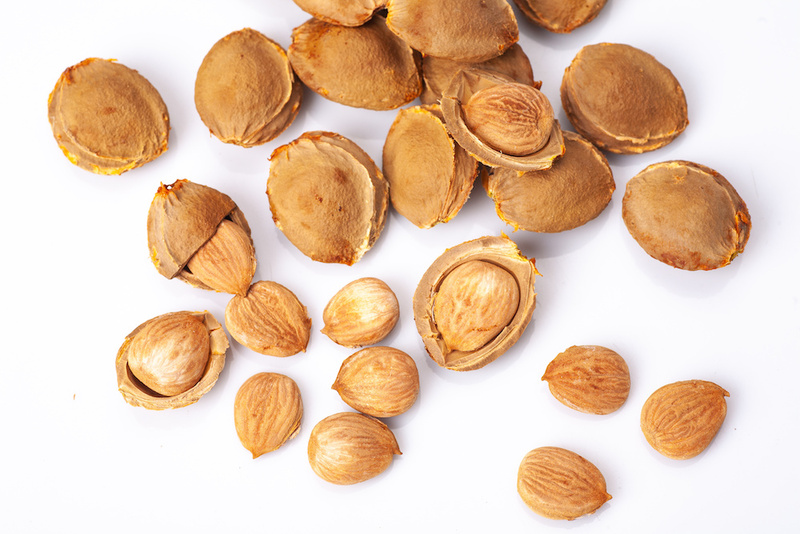 Apricot seeds are one of several herbs that contain a compound called amygdalin. Besides being in apricot pits, it’s also found in other pits or seeds of fruits in the rose family. These include apples, plums, cherries, pears, and almonds (especially bitter almonds). It’s also found in macadamia nuts, millet, buckwheat, flaxseeds, and a few vegetables.
Apricot seeds are one of several herbs that contain a compound called amygdalin. Besides being in apricot pits, it’s also found in other pits or seeds of fruits in the rose family. These include apples, plums, cherries, pears, and almonds (especially bitter almonds). It’s also found in macadamia nuts, millet, buckwheat, flaxseeds, and a few vegetables.
A synthetic drug called laetrile was developed from amygdalin and promoted as a natural cancer cure during the 1970s. This was when I was first getting started in herbal medicine and I remember that one of my uncles tried eating apricot seeds when he got cancer. I don't think it helped him. Laetrile was found to be ineffective and potentially toxic and was eventually banned. Unfortunately, this also resulted in a bad rap for amygdalin.
In large amounts, amygdalin can be toxic because it can be hydrolyzed in the digestive tract to produce toxic cyanides. The level of production of these compounds appears to depend on the composition of gut microbes. Examples of cyanides include hydrogen cyanide (HCN), sodium cyanide (NaCN), potassium cyanide (KCN), and calcium cyanide (Ca(CN)2).
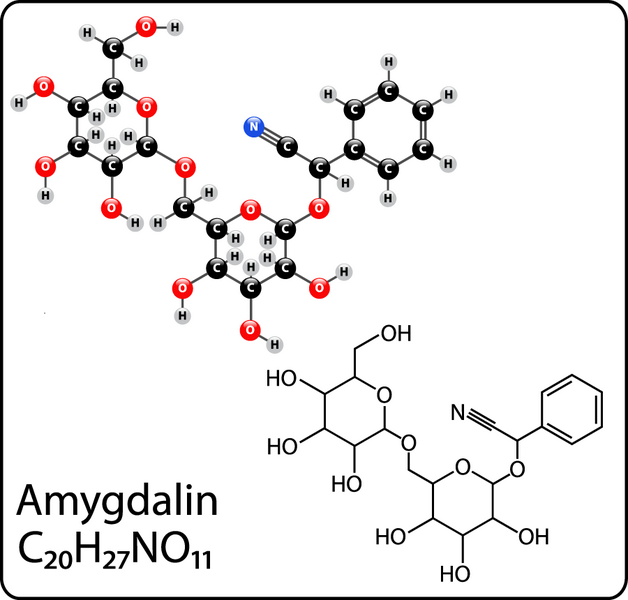 The presence of amygdalin doesn't mean that apricot seeds can't be used as a medicine. There are many common foods and medicinal herbs that contain compounds that are safe in small quantities but are toxic in large amounts. Plus, there are potential health benefits from amygdalin. Research shows that it acts as an antioxidant and has anti-inflammatory and immune-modulating properties. It can also be analgesic, improve the gut microbiome, and probably even has some anticancer properties. If you’d like to learn more about amygdalin, here’s a great paper to read: Amygdalin: A Review on Its Characteristics, Antioxidant Potential, Gastrointestinal Microbiota Intervention, Anticancer Therapeutic and Mechanisms, Toxicity, and Encapsulation
The presence of amygdalin doesn't mean that apricot seeds can't be used as a medicine. There are many common foods and medicinal herbs that contain compounds that are safe in small quantities but are toxic in large amounts. Plus, there are potential health benefits from amygdalin. Research shows that it acts as an antioxidant and has anti-inflammatory and immune-modulating properties. It can also be analgesic, improve the gut microbiome, and probably even has some anticancer properties. If you’d like to learn more about amygdalin, here’s a great paper to read: Amygdalin: A Review on Its Characteristics, Antioxidant Potential, Gastrointestinal Microbiota Intervention, Anticancer Therapeutic and Mechanisms, Toxicity, and Encapsulation
The bottom line is that I'm not concerned with using apricot seeds in small amounts and for short periods, especially as part of a formula. The TCM cautions for the herb include not giving it to infants (which means you probably shouldn’t give it to young children either). It’s also contraindicated in yin deficiency and in cases of diarrhea.
Apricot Fruits
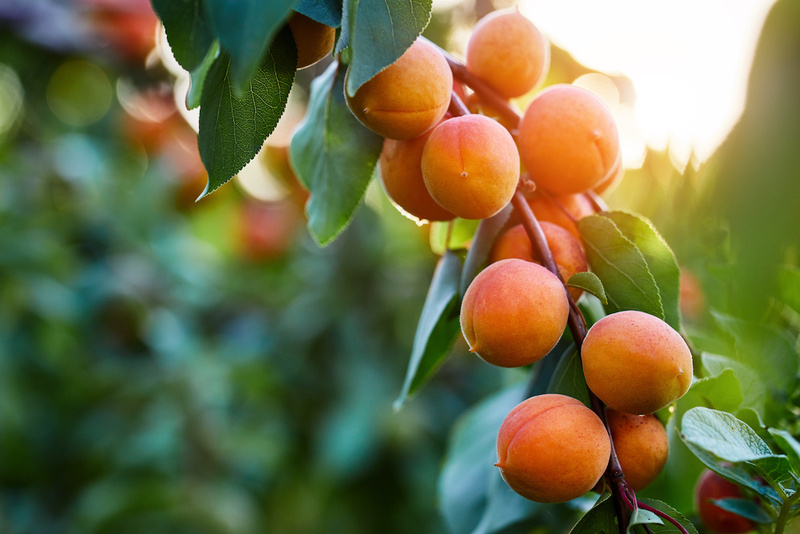 The orange color of apricots is due to the antioxidants they contain, which include beta carotene, lutein, and zeaxanthin. These antioxidants are particularly helpful for protecting both your skin and eyes from oxidative damage from UV radiation. This is a valuable thing to know since apricots ripen in the middle of summer when exposure to the effects of sunlight are strongest. Apricots are also a good source of soluble fiber, which helps your digestive tract by soothing mucus membranes, bulking the stool, and feeding friendly bacteria.
The orange color of apricots is due to the antioxidants they contain, which include beta carotene, lutein, and zeaxanthin. These antioxidants are particularly helpful for protecting both your skin and eyes from oxidative damage from UV radiation. This is a valuable thing to know since apricots ripen in the middle of summer when exposure to the effects of sunlight are strongest. Apricots are also a good source of soluble fiber, which helps your digestive tract by soothing mucus membranes, bulking the stool, and feeding friendly bacteria.
Apricots are easy to dry because they readily separate into two halves. After pulling them apart and removing the pit, you can simply put them on a screen, cover them with another screen to keep the bugs off, and dry them in the sun. While this doesn’t result in the orange-colored commercially dried apricots, you’re avoiding the sulfates used in commercial drying, which can be problematic for some people. You can help preserve some of the color if you dip them into water containing vitamin C powder or citric acid first. Dried apricots are a good source of both iron and copper, making them a potentially beneficial food for anemia.
I also like to bottle apricots. I halve them and bottle them in white grape juice (instead of sugar syrup) or just juice them and bottle the juice. Because the juice (also called apricot nectar) is thick, I sometimes add a little white grape juice to thin it down. I love mixing bottled apricot nectar with some orange juice as a nutritious beverage.
Apricot Flower Essence
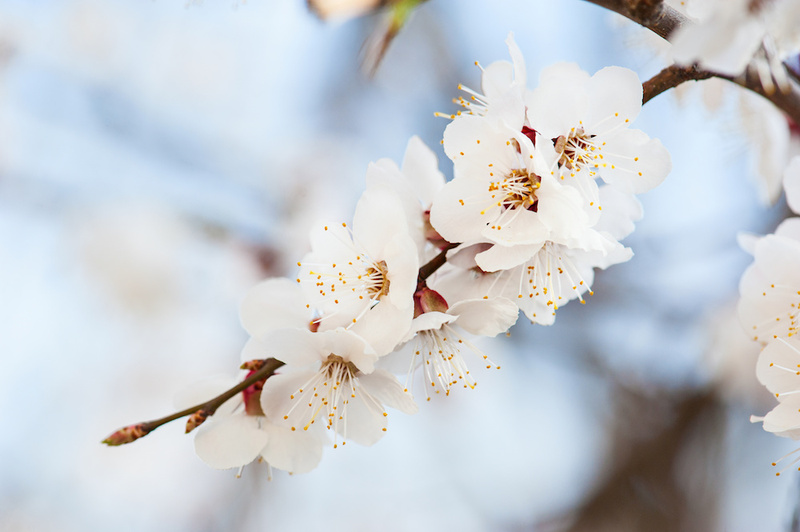 Apricot flower essence is one of the experimental essences offered by Flower Essence Services (the primary company I use for flower essences), which means they’re still testing how it is used. Other companies that make it share some common themes in describing its effects, the main one being that it aids times of transition when things are shifting in your life and you are feeling apprehensive, or your life is in a state of turmoil. The general sense is that it helps you adapt to and embrace major life changes.
Apricot flower essence is one of the experimental essences offered by Flower Essence Services (the primary company I use for flower essences), which means they’re still testing how it is used. Other companies that make it share some common themes in describing its effects, the main one being that it aids times of transition when things are shifting in your life and you are feeling apprehensive, or your life is in a state of turmoil. The general sense is that it helps you adapt to and embrace major life changes.
One source suggests it helps you step back from the stress of the changing conditions and observe the situation from a more neutral perspective, so you can see the situation with a more detached clarity. They also say it may also reduce sugar cravings, which I’ve found is a common problem for me when I’m unsettled in life. With all the changes currently going on in the world, this might be a valuable remedy for many people who are struggling with a sense of instability associated with world events.
However, you choose to enjoy them, apricots are a nutritious, healthy food and a potential medicine when used properly.
Downloads
Steven's Articles
-

-
Eucommia Bark
A superior tonic that promotes kidney, structural,…
January
-

-
Goldenthread, Phellodendron, and Yellow Root
Three herbal remedies containing the infection-fighting…
-

-
Teasel
A traditional herb for healing bones and joints…
-

-
Barberry and Healthy Personal Boundaries
A thorny shrub for fighting infections and supporting…
December
-

-
The Evidence for Berberine
A yellow alkaloid found in traditional infection-fighting…
-

-
The Sensible Use of Caffeinated Herbs
Kola nuts, guarana, and yerba mate and other herbs…
-

-
The Health Benefits and Problems with Coffee
This popular caffeinated beverage can be beneficial…
October
-

-
Understanding Caffeine & Cellular Adaptation
Preserving the power of caffeine's buzz and the…
September
-

-
Horseradish
A pungent spice for aiding protein metabolism…
-

-
Banaba or Crepe Myrtle
A beautiful tree from Southeast Asia whose leaves…
August
-

-
Monkeyflowers
Flower essences to help see ourselves more clearly…
-

-
Mariposa Lilies
Strengthening the bond between mother and child…
-

-
The Noble Bay Leaf
A common kitchen herb for aiding digestion and…
-

-
Epimedium: Horny Goat Weed
A circulatory stimulant and kidney yang tonic…
July
-

-
The Medicinal and Nutritional Benefits of Apricots
A nutritious fruit and valuable medicinal seed for coughs

